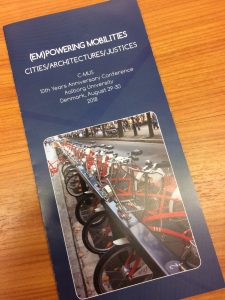(Em)Powering Mobilities 2018 (CMUS)
(Em)Powering Mobilities: Cities/Architectures/Justices
Aalborg University, Centre for Mobilities and Urban Studies, 29-30 August 2018
Deadline for abstract submissionhas been pushed to 16 May 2018.
See here for detail
The 10th Year Anniversary conference at the Center for Mobilities and Urban Studies (C-MUS) take on the pertinent themes of power, empowerment, and mobilities. Wherever we face mobilities we also face questions of power, stratification, social differentiation, social exclusion, and immobilities. Contemporary mobilities and their infrastructural landscapes filter, channel, and sort the movement of citizen groups according to various underpinning rationalities of inclusion and exclusion. Moreover, the infrastructural landscapes bring unforeseen effects, disrupted mobilities, and fragile and fragmented outcomes as well. At times such selection leans on technical skills, at other times on embodied capacities, and yet other connects to (economic) resources. Mobility capital in its various formats becomes a stratifying factor that enables and prevents particular social practices. Moreover, the formation of mobile subject categories and subject positions within the networked mobilities assemblages increasingly becomes contested spaces of political articulation and counter practices. Mobilities may be thought as a contested resource and privilege, a productive force of social change, and a field of power struggles. However, the empowering potentials of enhanced mobilities may also work in progressive ways to increase human flourishing, cultural interaction, and co-creation. The ‘(em)Powering Mobilities’ C-MUS conference sheds new light on these classic themes by in particular addressing how questions of justice and injustice connects to mobilities in cities and its architectures. The governance, planning and design of cities is a co-organizer of how people, goods, and information move. Infrastructural systems, spaces, and structures afford e.g. speed, access, interaction, culture, sociality, and public life. However, they are also contested spaces, in, e.g., the limitation they put to practices, privileging some uses, users, mobilities and cultures over others. The architecture of infrastructure may sometimes even be a stratifying factor in and of itself. To address these issues the conference invites contributions from across a wide array of disciplines such as architecture, geography, sociology, urban design, urban and traffic planning, political science, anthropology, interaction design, digital media to mention just a few. The common denominator will be how the so-called ‘Mobilities turn’ may aid new understandings and analysis of the mobility-power nexus in contemporary and future cities. The conference will offer three international keynote speeches, six parallel session themes, and stimulating ‘interfaces’ of art, design, and experimentation.

